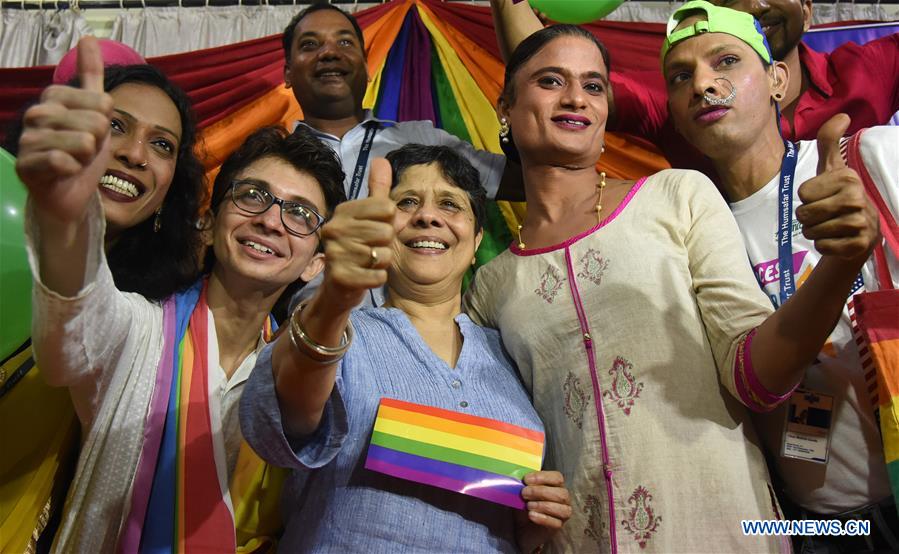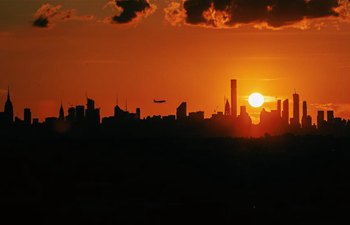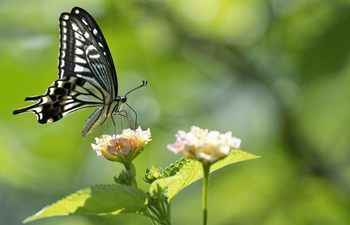
Members of the Lesbian, Gay, Bisexual and Transgender community celebrate in Mumbai, India, on Sept. 6, 2018. India's Supreme Court legalized gay sex in a historic judgment Thursday apparently scrapping the 158-year-old colonial-era law that criminalized homosexuality. (Xinhua/Stringer)
NEW DELHI, Sept. 6 (Xinhua) -- India's Supreme Court legalized gay sex in a historic judgment Thursday, scrapping down a 158-year-old colonial law that criminalized homosexuality.
A five-judge bench, headed by Chief Justice Dipak Misra, made it clear that the top court would not tolerate any kind of discrimination on the basis of anyone's sexual orientation as it struck down Section 377 of Indian Penal Code under which gay sex was an "unnatural offence."
"Any discrimination on the basis of sexual orientation violates fundamental rights. Social morality can't be used to violate fundamental rights of even one individual. Constitutional morality can not be martyred at the altar of social morality," the chief justice said.
Asserting that gay people have the same rights as of any ordinary citizen, Chief Justice Misra said, "Respect for each others rights, and others are supreme humanity. Criminalizing gay sex is irrational and indefensible."
Four other judges on the bench also gave consenting judgments. "History owes an apology to LGBT (lesbian, gay, bisexual, and transgender) persons for ostracization, discrimination," said Justice Indu Malhotra, the only woman judge on the bench.
Section 377 of Indian Penal Code says anyone who has "carnal intercourse against the order of nature with any man, woman or animal" shall be punished by up to 10 years in jail. Although prosecution is rare, gay activists say police exploit the law to harass community members.
Though the Delhi High Court had decriminalized consensual gay sex in 2009, but the top court had turned down the order and restored the law four years later, ruling that only the Indian Parliament has the right to change legislations.
However, the Supreme Court agreed to have a relook at its own order after five prominent members of the gay community approached it in 2016. And in July this year, the top court began hearings on a number of petitions seeking scrapping of the law.
The United Nations, the country's main opposition Congress party and gay rights activists have all welcomed the top court's landmark judgment.
"Sexual orientation and gender expression form an integral part of an individual's identity the world over, and violence, stigma and discrimination based on these attributes constitute an egregious violation of human rights," the United Nations said in a statement.
Congress lawmaker Shashi Tharoor also hailed the order. "In this country, we've allowed government to interfere in private lives of people to discriminate against people on basis of sexual orientation, but the Supreme Court stood up for equal treatment of citizens," he said.
Bollywood's leading filmmaker and prominent gay rights sympathiser Karan Johar also lauded the "historic judgment."
"So proud today. Decriminalizing homosexuality and abolishing #Section377 is a huge thumbs-up for humanity and equal rights. The country gets its oxygen back," tweeted the 46-year-old filmmaker. His post was swiftly followed by several Bollywood actors.
Though the apex court's judgment legalized gay sex among consenting adults in private, some activists say it still remains too early to say what this will translate to in the long term.
"Let's celebrate now, but be cautious too," said Nayana Gujral, an activist.











